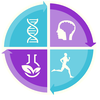Life Saving Facts
- Dietary choices are linked to 70 percent of all diseases affecting Americans.
- Only 30 of 125 U.S. medical schools require doctors to take a nutrition course.
- In four years of school, the average physician [MD] gets only 2.5 hours of nutritional training.
- The average American's diet includes consuming 140 pounds of sugar a year.
- There is twice as much calcium (which protects against osteoporosis and colon cancer) in a cup of spinach as a cup of milk.
- Approximately 300 enzymes are known to require zinc for their activities.
MINERALS
- Calcium helps neuromuscular relaxation and excitability (this helps heart functions).
- Calcium is important in blood coagulation.
- Calcium is important in the transmission of nerve impulses.
- Calcium increases resistance to infection.
- Calcium promotes cellular adhesiveness and strength.
- Calcium helps with the maintenance and function of cell membranes.
- Calcium helps with the activation of enzyme reactions and hormone secretions.
- Calcium is vital for pregnancy and nursing (fetus, infant, and mother).
- Zinc is required for DNA synthesis, cell division and protein synthesis.
- Zinc is found in hundreds of types of nucleoproteins which are involved in gene expression of various proteins.
- Zinc deficiency also affects proliferation and maturity of lymphocytes adversely [impaired immune response to infection].
PHYTOCHEMICALS - Phytochemicals give plants their flavor, aroma and pigment, have many roles in potentially preventing cancer growth.
- Phytochemicals block hormonal actions and metabolic pathways associated with cancer evolution, stimulate enzymes that flush out carcinogens and suppress the growth and division of cancer cells.
- The phytochemical Lycopene, found in tomatoes and red grapefruit, is actually twice as powerful as beta-carotene at eliminating free radicals.
- Whole grains — the staples of civilizations for centuries — provide a valuable source of fiber, phytochemicals and antioxidants, which the refining process, unfortunately, removes.
CANCER
- The bottom-line? “Cancer is a preventable disease.” Go Heavy on Veggies to Prevent Cancer, New York Times; June 28, 1999.
- One in three people will get cancer.
- The American Cancer Society predicts that a full one-third of the 563,000 cancer deaths in 1999 will be nutrition-related. [Much more than they used to admit]
- The American Institute for Cancer Research found that appropriate diets alone may prevent three to four million cancer cases a year worldwide.
- Eating five servings of fruits and vegetables a day may prevent well over 20 percent of all cancer cases, including those of the colon, stomach, lung, esophagus, breast, bladder, pancreas and prostate.
- "Cancer is usually the result of a decades-long process and nutrition is a way of thwarting each step.”
- Some of the most powerful cancer-fighters are antioxidants which stabilize free radicals (highly reactive oxygen molecules) and halt cellular damage.
- Vitamin C, an antioxidant in citrus fruits and strawberries, also raises the activity of “natural killer cells,” which search for roaming cancer.
- Vitamin E, in leafy greens and nuts, may protect against genetic defects that increase cancer risk.
- Beta-carotene, in carrots and sweet potatoes, may block the formation of tumors.
- Maitake and shiitake mushrooms stimulate immune function.
- Selenium, a mineral found in grains, seeds and garlic, induces cancer cell death.
- Antioxidants in turmeric, an herb in curry powder, prevent DNA damage and block tumor growth.
